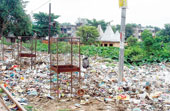 |
| Bariatu Road in Ranchi is a plastic dump |
A hitherto estranged state is, finally, befriending the environment.
The Jharkhand State Pollution Control Board (JSCPB) has decided to enforce a blanket ban on plastic bags below 50 microns and set their minimum size at 18x12 inches, failing which an offender may be fined, face cancellation of trade licence or even be jailed.
Ever since the state was carved out of an undivided Bihar in 2000, this is the first time the apex pollution monitor has made a definite move to establish its own standards for manufacturing, sale, storage and use of plastic bags.
The new rules — to come into effect from World Environment Day on June 5 — were fixed at a meeting on Saturday, attended by the forest and environment secretary and JSPCB and mining officials among others.
“It is a landmark decision, which has been duly passed by the board. The proposal is being sent to forest and environment secretary Alka Tiwari for formal notification. The notification will guide enforcing agencies (civic bodies and district administrations) on the penalty front. We will bring the new standards into force from June 5,” JSPCB chairman Mani Shankar confirmed, on the sidelines of a news meet at his office in Ranchi on Sunday.
Central Pollution Control Board estimates suggest that over 10,000 tonnes of plastic trash is generated across India each day, accounting for 9 per cent of the nation’s 1,20,000-tonne daily output of municipal solid waste.
After the Supreme Court’s intervention on this plastic misuse, the Union ministry of forest and environment had notified the Plastic Waste (Management and Handling) Rules on February 4, 2011.
The Rules mandated that plastic carry bags could not be less than 40 microns in thickness and were required to be of a minimum size of 8x12 inches. But true to its disrepute, Jharkhand — which has no official data on plastic waste generated daily — failed to implement the guidelines effectively for a litany of reasons, ranging from “no tuning” between district administrations and civic bodies to sheer lack of will.
Shankar, however, insisted that from June, plastic rules would be more stringent across the state. “It is a serious issue and the JSPCB is bound to enforce it in toto. You will see the difference now,” he said.
On the variation of thickness he said: “According to the 2011 rules, plastic bags can be of any thickness between 40 and 100 microns, which makes them recyclable. Some states have fixed the cut off at 40, some at 60 and so forth. We discussed the matter with all our members and decided to fix 50 microns as our standard thickness,” he said.
Besides plastic peril, the JSPCB also took stock of air pollution. Henceforth, every small-scale unit — be it a stone crusher or an iron ore firm — will have to identify barren land and undertake an afforestation drive (minimum 100 plants) to get a no-objection certificate (NOC) to operate.
“To maintain transparency and ensure proper implementation of this order, one has to give an undertaking while applying for NOC. They will have to identify land and submit its photograph. Once the NOC is given, plantation work will have to begin in the presence of local officials who will photograph it for the record. The unit will nurture the plants for five years. Visual evidence will help us keep track of their activities and prevent fraud,” Shankar said.
Other important decisions of the JSPCB also included power to regional pollution offices and online services. “Our job is to generate awareness too. We have given consent to the National Informatics Centre to begin work on an online application system. This will enable transparency,” the JSPCB chief added.
Can the new rule stem plastic menace in the state?
Tell ttkhand@abpmail.com










